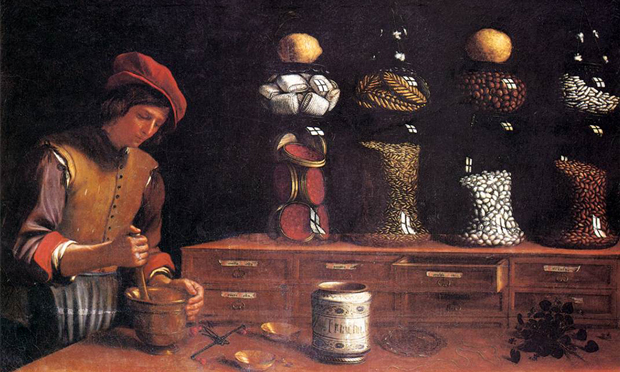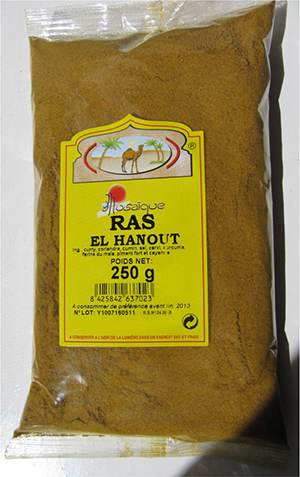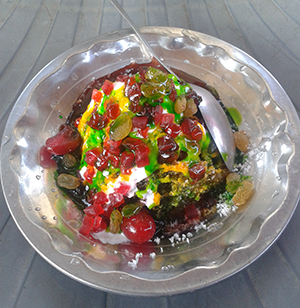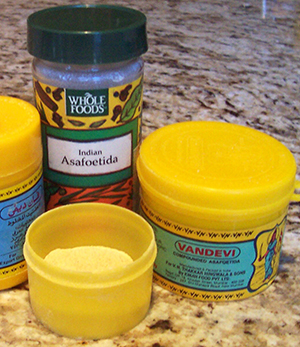Food year resolutions: Gillian Riley on having a spicy start to your New Year

All things nice: detail from Paolo Antonio Barbieri’s The Spice Shop (1637). Image: Wikimedia Commons
We can enjoy tastier, healthier, home-cooked food by using the spices, herbs and flavourings that are fun to use and now so easy to find in Hackney.
Decades ago they could be found in indigenous ethnic stores, many of which have now vanished, replaced by coffee shops and nail parlours. Back then, Bangladeshi or Indian shops, Turkish stores, Italian delis and market stalls with African products were selling spices to households for everyday use, not as exotic ingredients.
They were all there in plain sight, and it is only now they are disappearing that we miss them.
Today there are so many new and long established companies providing herbs and spices in Hackney or online, that we can experiment cheerfully.
Seasoned Pioneers sell small self-sealing foil packs of ground and whole spices, which keep the contents airtight and away from daylight – better value than larger amounts. Once ground, spices lose the essential oils that carry the flavours, so it is always a good idea to have a stockpile and grind them just before using.
The best way is to use a coarse-grained stone pestle and mortar where the pounding of the spices releases more flavour than the cutting motions of an electric grinder.
And please, please do not use the term ‘blitz’ for this procedure, those of us who can remember WW2 might find it a tad insensitive.
We could also make a New Year’s resolution to stop ‘drizzling’ olive oil over stuff; this misuse of a meteorological term, meaning a fine wet rain or mist, is a mindless abuse of language, when oil can be dribbled, poured, sloshed or whatever. Perhaps ‘dribble’ is too closely associated with incontinent babies or spit, but it’s more accurate.
Ras el hanout

Ras el hanout. Photograph: Wikimedia Commons
Jamie Oliver’s Five Ingredients was right at the top of the Guardian’s list of best sellers for 2017. The first recipe he features involves ras el hanout – a Moroccan spice mixture – and salted lemons, another Middle Eastern product.
His website had worried fans anxious to source the lemons, but never batting an eyelid at the ras el hanout, which several decades ago was so hard to find that I had to get supplies sent me from a French friend in Morocco.§
On the Customs Declaration form for the contents of the parcel she wrote ‘drogues’, and the pungent package – including the now banned cantharides beetle (a powerful aphrodisiac), together with grains of paradise, cubebs, long pepper and numerous unidentified twigs and berries – arrived unopened and unexamined. That was then.
Kala Khatta Gola
A sorbet sensation that blows the mind.

An Indian Gola, often flavoured with black salt. Photograph: Wikimedia Commons
At Dishoom in Shoreditch we are reminded yet again that there is always something fresh to learn, new or ancient flavours to discover, amazing sensations to yearn for. This water ice is made from a tart but tasty berry, kokum (garcina indica), in a syrup flavoured with an enigmatic mixture of sugar, spices and black salt, kala namak. This shrieks of umami.
Like MSG, it is a naturally occuring substance, but can also be made artificially, by mixing sea salt with fire pit ash or similar, which creates a sort of smoky, sulphorous taste that works a bit like asafoetida. Black salt can be added to many dishes, to give a meaty eggyness to vegetarian food, or enliven a simple stew.
Asafoetida

Asafoetida. Photograph: Wikimedia Commons
A foul-smelling powder made from the dried root of a plant of the ferula or fennel family. A tiny amount gives a lift to bland food, like dahl or a mild curry, adding a sort of garlicky, oniony note – which is fine if the dose is just a pinch, but otherwise it can create quite a pong.
In Classical times, there was a wild plant growing in what is now Libya, known as silphium, probably from the same extended ferula family, which was so delicious and desirable that it was over-harvested and became extinct.
Just as well for our entrepreneurial legionary, for if he had this hidden in his pack, he might have had to endure unkind comments on the state of his socks.
Note that the best quality asafoetida has been available at Mystic Fragrance on Stoke Newington Road for decades.
Umami
We wrote last August about how the Wicked Stepmother MSG has morphed into Fairy Godmother now that umami is everywhere. The Wicked Stepmother, despised and rejected as a chemical food additive, or on the other hand, the Fairy Godmother praised as a righteous organic flavour enhancer.
It’s as well to remember that since the beginnings of history, the early hunter/gatherers were bringing home herbs and berries to enjoy with the roast, or season the porridge.
Our legendary legionary, toiling up Stamford Hill, with his illicit stash of garum, and liquamen, and garlic, and spicy Luganiga sausage, pickled lemons, and pastrami, was perhaps offering Hackney citizens a taste of umami, long before today’s massive availability of several different kinds of soy sauce, fish sauce, Thai and Indonesian fermented fish pastes, trasi, Korean chilli bean pastes, doenjang, Japanese miso and dried bonito flakes, parmesan cheese, and much more…
Some small things that gave pleasure in Hackney last year:
Meat N16’s sausage competition was won by eight-year-old Martha, with a recipe including pork, quince paste, blue cheese and mace – all umami-rich flavourings. She must be Hackney’s youngest sausage champion ever. Congratulations!
The ‘grannies’ in Akdeniz bakery in Stoke Newington who make their flatbread with such skill, and give us all such a warm welcome. The cheese and spinach version is probably the best value meal in Hackney: hot from the oven, it knocks trendy wraps into a cocked hat at a fraction of the price.
Pastrami made in-house at Monty’s Deli in Hoxton. While commercial versions, from Turkish or Jewish stores, have become less satisfactory over the years, flabby and rubbery, this delicious non-kosher pastrami is tender and fragrant with black pepper and spices. You could cut it with a spoon, and it is wonderful with their home-made coleslaw and sauerkraut.
